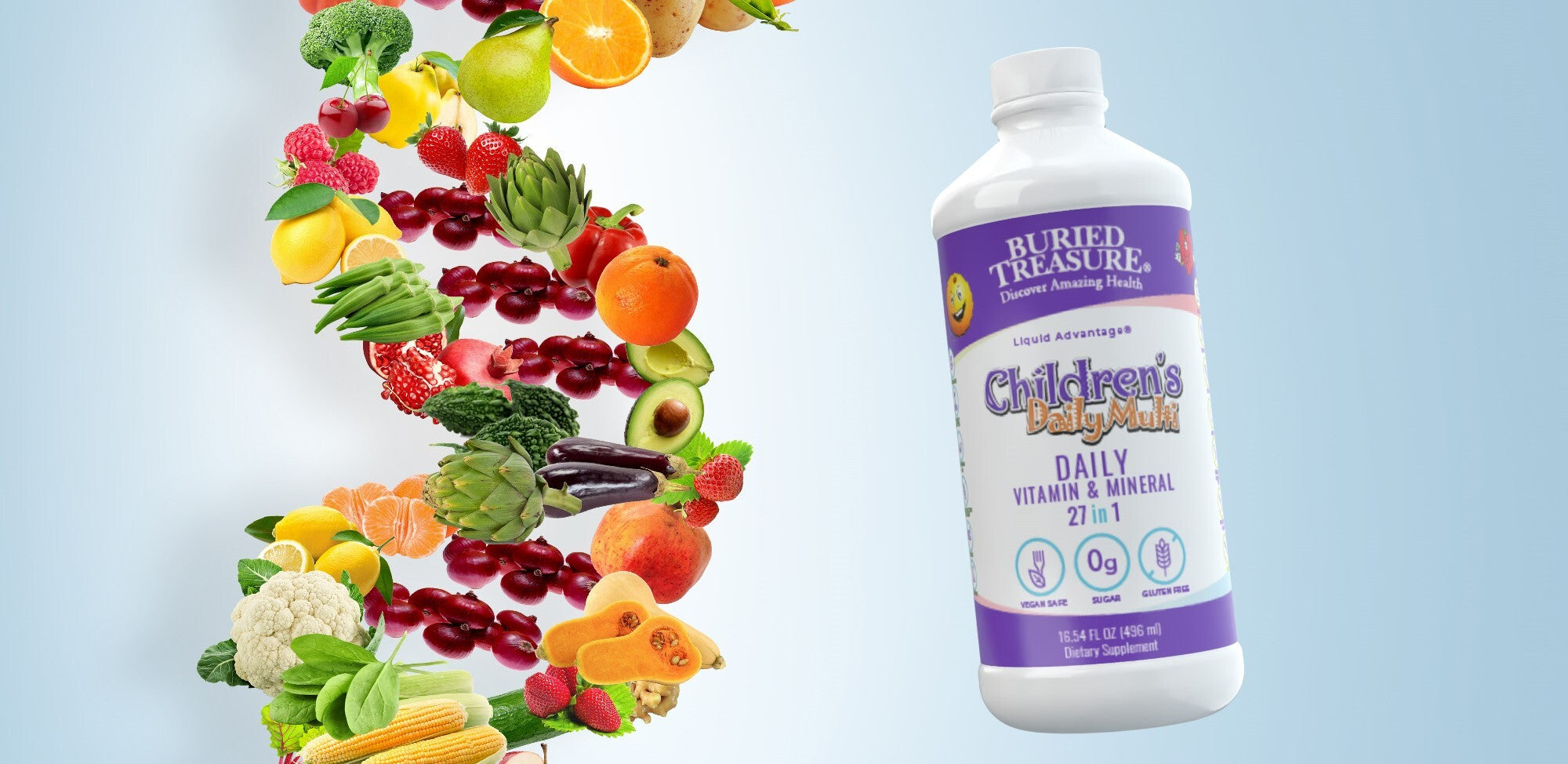Do Children need to take vitamins?

For Educational Purposes Only
A well balanced diet should provide enough vitamins and minerals for children, although if their diet is poor, they may need additional nutrition support.
Nutrition is so important for children’s health because they need the nutrients for growth. Worldwide statistics show that 50% or more of children less than 5 years old have vitamin and mineral deficiencies.
As they start school, they have multiple nutritional needs. Parents may see it as a time to relax, but actually there is a major concern for what kids are eating in school. It is very important to educate your kids as to what healthy food choices including snacks will do for their hair, skin and nails. Telling them eat this and don’t eat that doesn’t provide a reason to pass off greasy hamburgers and fries. These nutritional habits may last throughout their whole life.
Vitamins and minerals provide the necessary building blocks for many functions in the body including growth and repair. Fruits and vegetables contain many of these nutrients. Having children try different vegetables and fruit is important. It is okay if they do not like them, at least they have tried them. The nutrients that they require are the same, but the amounts differ. Protein, carbohydrates and healthy fats are necessary to keep balanced. They have different functions.
If children are not consuming enough fruits and vegetables there is a good chance that they are low in vitamin A and vitamin C. Some children that have a poor diet eating much candy, cake and cookies may be low in B Vitamins since they are found in different foods such as whole grain products and meat.
If children are not eating well balanced meals from fresh, whole foods or they are finicky eaters who do not eat enough food they may need a vitamin mineral supplement. A multiple vitamin mineral product provides a balance of the necessary nutrients for children’s health. Many work together in harmony such as the B vitamins and also calcium and vitamin D.
Nutrients Necessary for Particular Functions:
The central nervous system including the brain require nutrients such as the B vitamins, vitamin C, zinc, calcium and magnesium, which helps cognitive function, learning and memory.
Bone Health and Growth – The bones need calcium and vitamin D with other bone supporting nutrients, which include magnesium, boron, manganese, zinc and copper.
Energy pathways – To stay healthy, children need to maintain nutrient levels like the B vitamins which operate as co-factors to make energy.
Some important vitamins and minerals needed by children
Vitamin A (beta carotene) - is a fat soluble vitamin that is essential for children. It is necessary for eyesight, healthy skin, bones and immune function. Beta carotene is a source that provides vitamin A, which is found in the pigment of bright rich colors of yellow, orange and red in vegetables. It is also needed for cell growth.
Vitamin D is a fat soluble vitamin that helps the absorption of calcium and phosphorus levels in the body. It is necessary to help build strong bones and is needed for the nerves and muscles to function properly. Deficiencies can lead to problems with the bones and immune system. Although children can make vitamin D from the sun, they still may not be getting enough into their bodies.
B Vitamins are water soluble and include thiamin, niacin, riboflavin, folic acid, biotin, B-6, B-12 and pantothenic acid. Many act as cofactors within cells to manufacture energy.
Folic acid as folate or vitamin B9 helps the body especially early when the fetus is growing and developing. Folate is necessary for the brain and spinal cord. During growth it helps to make new healthy cells and the genetic material DNA and RNA. It also helps to form red blood cells and some amino acids.
Vitamin C (ascorbic acid) is a water soluble vitamin which is an antioxidant to help protect the body from free radicals. It is also necessary for to provide immune system support.
Vitamin E is a fat soluble vitamin with powerful antioxidant properties, helping to protect cell membranes from free radicals. It is used to help red blood cells to function properly and for the nervous system and the bones.
Iron is a critically important mineral for physical and cognitive function in children. There is data that shows that both pregnant women and children are most vulnerable to deficiencies. Iron deficiency is a leading cause of anemia and affects 40% of children that are less than 5 years old and 30% of pregnant women around the world.
Zinc is a mineral, which is needed by children to promote immune health functions. It helps their bodies to resist outside invaders that harm the body. Zinc also has been shown to help the gastrointestinal tract and help with growth.
Copper is an important mineral also to help the immune system, but is required for the brain, blood vessels and connective tissue. It is necessary to take with zinc if taken in a supplement.
Calcium is a critically important mineral that is found in bones and in teeth. It is also essential for the heart, the nerves and is needed for metabolism and it helps muscle contraction.
Magnesium is a mineral necessary to help build bones, but also helps to maintain proper muscle and nerve function. It is needed for metabolic pathways and it is a cofactor, which helps in enzymatic reactions. In addition, it is necessary for nerve function, blood sugar balance and proper blood pressure.
Manganese is necessary for the bones and operates to protect cells from damage. It is used for immune function and blood clotting.
Selenium is a trace mineral that is important for the body to function properly. It works as an antioxidant and is necessary for proper immune system support and helps antibodies. It is used in DNA production and thyroid gland function.
Chromium is an essential trace element and needed for proper glucose balance. It is involved in helping glucose to be absorbed into cells and converted into usable energy.
Potassium is an essential mineral for muscle contraction and kidney and heart function. It is an electrolyte, which helps the body maintain fluids.
It is essential that parents keep vitamin and mineral supplements out of reach of young children since it can prevent over consumption. One should discuss the importance and recommended doses with older kids for their understanding.
It is important to know that although vitamin and minerals are important for children, taking too high of a dose can be harmful. This is especially important with the fat soluble vitamins A, D, E, and K since they are stored in body fat. Parents should follow the instructions on supplement labels.
Summary - Children need proper nutrition in order to be healthy and because they need the nutrients for growth. Vitamins and minerals all have unique functions to help children with their mental and physical health. There are vitamins and minerals in supplement form if parents feel that their children may be lacking nutrients in their diet.
If your child has a health condition and or take medication, it’s always best to check with your healthcare provider prior to having them take supplements.
Disclaimer: The statements made on this website have not been evaluated by the Food and Drug Administration (FDA). The products and information provided on this website are not intended to diagnose, treat, cure, or prevent any disease. The information presented on this website is for informational purposes only and is not intended as a substitute for advice from your physician or other healthcare professional. You should not use the information or products on this website for diagnosing or treating a health problem or disease, or prescribing any medication or other treatment. Please consult your healthcare provider before starting any new supplement, diet, exercise, or health program.
References
The Center for Disease Control (CDC) https://www.cdc.gov/nutrition/micronutrient-malnutrition/micronutrients/index.html. Assessed 0718/22.
The state of the world’s children 2019; children, food and nutrition: growing well in a changing world external icon. UNICEF; 2019. Assessed 071922.
World Health Organization. e-Library of evidence for nutrition actions external icon. Accessed June 18, 2021.



